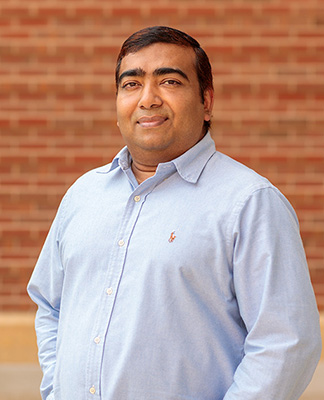Sep 25, 2024
Midwest Healthcare Management Conference showcases AI and technology-driven healthcare innovation
Technology-driven early detection for dementia and health kiosks for rural communities were among the breakthrough ideas shared at the fourth Midwest Healthcare Management Conference, organized by Gies College of Business and Carle Illinois College of Medicine.
More than 100 academics, health practitioners, and policymakers met August 23 to discuss “Digital Technology and AI-Enabled Healthcare Delivery to Diverse Patient Populations.” Speakers addressed how innovations in telemedicine, wearable health monitors, blockchain, and analytics are redefining patient care by improving access, efficiency, and outcomes.
Gies College of Business is home to more than 15 faculty who specialize in healthcare-related research. Through its recently created Health Care Research Initiative, which is led by associate professor of finance David Molitor, Gies has continued its investment in supporting these scholars who explore the intersection of health outcomes and business. That environment makes Gies and the University of Illinois a perfect home for this conference, which was first held in 2019.

“Because Illinois has the first engineering-based medical school, we’ve established a platform for exploring multidisciplinary approaches to healthcare solutions,” said Ujjal Mukherjee (right), associate professor of business administration and forum organizer. “A key focus is leveraging technology and business strategies to address rural healthcare issues like access.”
Dmitri Sumkin, a Gies postdoctoral researcher, partnered with Ann Willemsen-Dunlap of OSF Healthcare, and Margarita Teran-Garcia of Illinois Extension to share how they are developing a Rural Health Kiosk to expand primary care to remote, rural populations. It integrates key healthcare services such as vital sign monitoring, telehealth consultations, and access to personal health records. The initiative addresses significant barriers to healthcare in underserved communities.
“The kiosk will act as a bridge between underserved communities and healthcare systems that brings individuals from these communities under the purview of managed care, specifically primary and preventative care,” said Sumkin. “This will reduce the load of emergency care by diverting avoidable emergency room visits to urgent care or primary care facilities. A data-driven placement of the kiosks is the key to successful implementation and adoption of the technology by the target patient groups, who are mostly uninsured.”
“Technology is key when patients don’t have access to healthcare, whether that’s a wearable heart monitor after a heart attack or reviewing biometric parameters that reduce follow-up visits to the emergency room or hospital re-admissions,” said Mukherjee, who explained that patients became less skeptical of telehealth during the pandemic.
Mukherjee added that validation of the efficacy of a wearable monitor that picks up early signs of heart failures by detecting irregular blood pressure fluctuations, heart rate, body temperature and edema and alerts the patient, provider, and emergency services can greatly reduce readmission and mortality of patients. The project’s team is in the process of conducting a randomized control trial with Carle Health.
Boston University’s Vijaya Kolachalama presented a paper about using AI for early detection of the different types of dementia, including Alzheimer’s disease.
“As life expectancy increases, we’re seeing an extraordinary rise of dementia in the US population, and technology has the ability to detect slight changes that patients and their caregivers cannot,” said Mukherjee. “Most patients and their loved ones do not detect dementia at an early stage, nor does the healthcare system have the capacity to adequately diagnose it.”
Mukherjee explained that dementia symptoms such as forgetfulness are often confounded with other things, but through machine learning and automated technologies, doctors will be able to cull data that can indicate the need for further investigation, such as an MRI. He is part of the team that includes Gies students and faculty as well as physicians from Carle Health, Carle Illinois College of Medicine, and Boston University.
“Our goal is to assess the precision and accuracy of dementia detection and explore how to create a clinical pathway for practitioners’ use,” said Mukherjee.
The conference was attended by practitioners from industry and researchers from business schools and medical schools at several universities. Some of the prominent academic presenters included:
- Tinglong Dai (Johns Hopkins), role of artificial intelligence in scaling healthcare delivery to a diverse population
- Diwakar Gupta (Texas), improving post-transplant outcomes of patients
- Bob Batt (Wisconsin), improving emergency care efficiency
- Yingchao Lan (Nebraska-Lincoln), importance of regularity in chronic care delivery
- Bhupinder Singh Juneja (Minnesota), social media based apps to address behavioral health issues
- Umit Celik (North Carolina), predictive algorithms in early detection and intervention in opioid treatment centers.
Some of the prominent industry speakers included:
- Ajay Sathyanarayan (Tata Elxsi), role of generative AI in precision medicine for cancer treatment
- Melinda Cooling (OSF Hospitals), role of digital health in bringing equity in healthcare delivery
- Matthew O’Donnell (EPIC Systems), AI in electronic medical record management systems
- Erick Scott (cStructure LLC), role of causal models in healthcare knowledge generation
- Sylvia Dziemian (Chicago Department of Public Health), design of sustainable micro clinics to deliver healthcare to underserved communities.
The conference also attracted more than 90 participants who formed 40-plus teams to compete in a data competition focused on structural causal modeling to estimate the causal effects of glucocorticoids on in-hospital survival rates among COVID-19 patients. The winning teams included undergraduates from the University of Illinois Urbana-Champaign’s statistics department and medical students from the Carle Illinois College of Medicine. The contest was underwritten by cStructure LLC.
“Gies Business is playing a critical role in fostering a community among researchers focused on healthcare solutions,” said Mukherjee. “We hope that, by inviting young scholars to join in the discussion, we will continue to play an important role in inspiring the next generation of healthcare-focused business leaders.”
